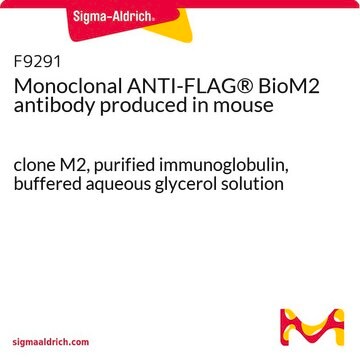Wichtige Dokumente
F2922
Monoclonal Anti-FLAG® BioM5−Biotin antibody produced in mouse
clone M5, purified immunoglobulin, buffered aqueous solution
About This Item
Empfohlene Produkte
Biologische Quelle
mouse
Konjugat
biotin conjugate
Antikörperform
purified immunoglobulin
Antikörper-Produkttyp
primary antibodies
Klon
M5, monoclonal
Form
buffered aqueous solution
Methode(n)
western blot (chemiluminescent): 2 μg/mL
Isotyp
IgG1
Versandbedingung
dry ice
Lagertemp.
−20°C
Allgemeine Beschreibung
Anwendung
The product binds the FLAG peptide only when it is located at the amino terminus preceded by a methionine. Binding is not Ca2+-dependent. It is useful for detecting cytoplasmically expressed Met-FLAG® fusion proteins in mammalian crude cell extracts, but not recommended for fusion proteins expressed in E. coli.
It can be used for immunodetection methods using avidin- or streptavidin-conjugated reporter enzymes such as streptavidin-peroxidase. Primary antibody conjugates are preferred when using murine cells as the recombinant protein host.
Browse additional application references in our FLAG® Literature portal.
Leistungsmerkmale und Vorteile
Physikalische Form
Rechtliche Hinweise
Sie haben nicht das passende Produkt gefunden?
Probieren Sie unser Produkt-Auswahlhilfe. aus.
Lagerklassenschlüssel
12 - Non Combustible Liquids
WGK
WGK 3
Flammpunkt (°F)
Not applicable
Flammpunkt (°C)
Not applicable
Analysenzertifikate (COA)
Suchen Sie nach Analysenzertifikate (COA), indem Sie die Lot-/Chargennummer des Produkts eingeben. Lot- und Chargennummern sind auf dem Produktetikett hinter den Wörtern ‘Lot’ oder ‘Batch’ (Lot oder Charge) zu finden.
Besitzen Sie dieses Produkt bereits?
In der Dokumentenbibliothek finden Sie die Dokumentation zu den Produkten, die Sie kürzlich erworben haben.
Unser Team von Wissenschaftlern verfügt über Erfahrung in allen Forschungsbereichen einschließlich Life Science, Materialwissenschaften, chemischer Synthese, Chromatographie, Analytik und vielen mehr..
Setzen Sie sich mit dem technischen Dienst in Verbindung.








